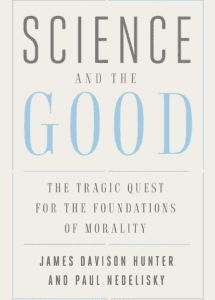 James Davison Hunter and Paul Nedelisky tackle the cultural trend (if not more) of thinking we can resolve our moral debates by greater science. Their book is called Science and the Good: The Tragic Quest for the Foundations of Morality.
James Davison Hunter and Paul Nedelisky tackle the cultural trend (if not more) of thinking we can resolve our moral debates by greater science. Their book is called Science and the Good: The Tragic Quest for the Foundations of Morality.
Their third chapter examines what happens with the Enlightenment and its aftermath into the 20th Century. It makes for a very good read.
And so it was that the Enlightenment spawned optimism about the power of human reason to systematically comprehend the natural world and serve as an authoritative guide to the practical realities of human affairs. By the eighteenth century, this optimism extended fully and explicitly to the ideal of building a moral science of humanity and, in this, a scientific foundation for morality itself.
In the chp they go through — with clarity — three major strands of attempts to ground ethics in science.
Sentimentalism identifies basic moral phenomena— good, bad, right, wrong, etc.—with feelings or sentiments, rather than with things or actions themselves.
Hume’s perceptions of what one finds pleasurable or unpleasurable is the focus. That is, a feeling of satisfaction. What we see as virtue or vice, for Hume, is what we experience in the face of specific behaviors.
Utilitarianism begins with Hobbes’s and Locke’s understanding of good and bad in terms of pleasure, and adds that all ethics consists of is calculating how much pleasure or pain actions produce.
Bentham, their focus, is the focus: Hume didn’t get it right. It can all be perceived through consequences for the most people, and they shifted interest from character to actions. What leads to the most for happiness?
Evolutionary ethics recognizes that human beings were produced by evolution and tries to connect moral progress to evolutionary development.
Darwin shifted the focus to natural selection and shared social dispositions that preserve the species. In this way ethics moved away from individualism to the collective. Spencer turned this toward social evolution and to progressivism.
But these approaches, building on one another, led to serious criticisms and shortfalls in the ability to find a genuinely objective and scientific morality. Their focus is on G.E. Moore’s famous Naturalistic Fallacy and Open Question Argument.
This has led, they contend, to a penetrating moral skepticism.











